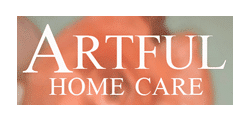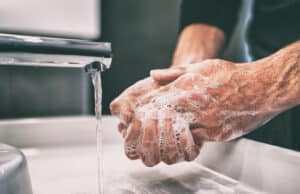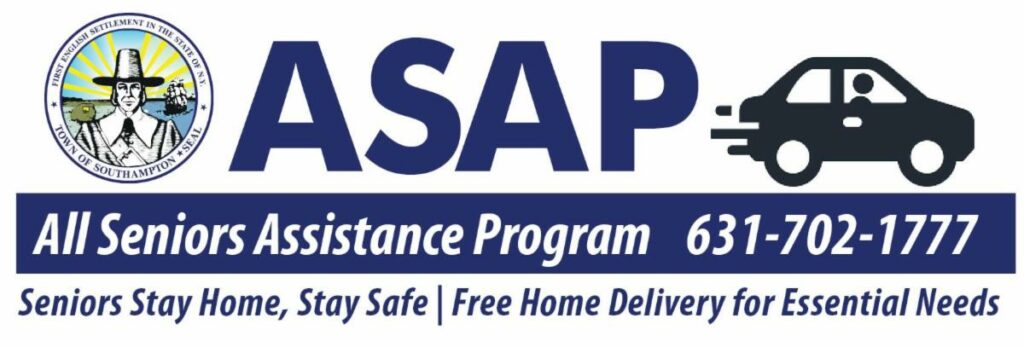Update on COVID-19 from Artful Home Care
For the latest and most up-to-date information for NY State, please visit: https://coronavirus.health.ny.gov/home
+++++++++++++++++++++++++++++++++++++
The Center for Disease Control (CDC) has clearly identified those over 60 as highly vulnerable to the Covid 19 Virus.
Southampton Town has launched a new FREE delivery service for seniors during this time of critical need and self-quarantining so that our seniors can better comply with the best precaution to protect themselves – Stay Home, Stay Safe.
This program, All Seniors Assistance Program – ASAP, has enlisted the support of local merchants who will accept prepaid phone orders for groceries, pharmacy needs and other essentials.
The Town will deliver those orders to our seniors at NO COST.
CALL 631-702-1777
OR CLICK HERE TO SIGN UP http://www.southamptontownny.gov/FormCenter/ASAP-All-Seniors-Assistance-Program-32/ASAP-Register-a-Senior-For-Delivery-138
++++++++++++++++++++++++++++++++++++++++
From the CDC:
Older adults and people who have severe underlying medical conditions like heart or lung disease or diabetes seem to be at higher risk for developing more serious complications from COVID-19 illness. More information on Are you at higher risk for serious illness?
Know How it Spreads
- There is currently no vaccine to prevent coronavirus disease 2019 (COVID-19).
- The best way to prevent illness is to avoid being exposed to this virus.
- The virus is thought to spread mainly from person-to-person.
- Between people who are in close contact with one another (within about 6 feet).
- Respiratory droplets produced when an infected person coughs or sneezes.
- These droplets can land in the mouths or noses of people who are nearby or possibly be inhaled into the lungs.
Take steps to protect yourself
Clean your hands often
- Wash your hands often with soap and water for at least 20 seconds especially after you have been in a public place, or after blowing your nose, coughing, or sneezing.
- If soap and water are not readily available, use a hand sanitizer that contains at least 60% alcohol. Cover all surfaces of your hands and rub them together until they feel dry.
- Avoid touching your eyes, nose, and mouth with unwashed hands.
Avoid close contact
- Avoid close contact with people who are sick
- Put distance between yourself and other people if COVID-19 is spreading in your community. This is especially important for people who are at higher risk of getting very sick.
Take steps to protect others
Stay home if you’re sick
- Stay home if you are sick, except to get medical care. Learn what to do if you are sick.
Cover coughs and sneezes
- Cover your mouth and nose with a tissue when you cough or sneeze or use the inside of your elbow.
- Throw used tissues in the trash.
- Immediately wash your hands with soap and water for at least 20 seconds. If soap and water are not readily available, clean your hands with a hand sanitizer that contains at least 60% alcohol.
Wear a facemask if you are sick
- If you are sick: You should wear a facemask when you are around other people (e.g., sharing a room or vehicle) and before you enter a healthcare provider’s office. If you are not able to wear a facemask (for example, because it causes trouble breathing), then you should do your best to cover your coughs and sneezes, and people who are caring for you should wear a facemask if they enter your room. Learn what to do if you are sick.
- If you are NOT sick: You do not need to wear a facemask unless you are caring for someone who is sick (and they are not able to wear a facemask). Facemasks may be in short supply and they should be saved for caregivers.
Clean and disinfect
- Clean AND disinfect frequently touched surfaces daily. This includes tables, doorknobs, light switches, countertops, handles, desks, phones, keyboards, toilets, faucets, and sinks.
- If surfaces are dirty, clean them: Use detergent or soap and water prior to disinfection.
To disinfect:
Most common EPA-registered household disinfectants will work. Use disinfectants appropriate for the surface.
Options include:
- Diluting your household bleach.
To make a bleach solution, mix:- 5 tablespoons (1/3rd cup) bleach per gallon of water
OR - 4 teaspoons bleach per quart of water
- 5 tablespoons (1/3rd cup) bleach per gallon of water
Follow the manufacturer’s instructions for application and proper ventilation. Check to ensure the product is not past its expiration date. Never mix household bleach with ammonia or any other cleanser. Unexpired household bleach will be effective against coronaviruses when properly diluted.
- Alcohol solutions.
Ensure the solution has at least 70% alcohol. - Other common EPA-registered household disinfectants.
Products with EPA-approved emerging viral pathogens pdf icon[7 pages]external icon claims are expected to be effective against COVID-19 based on data for harder to kill viruses. Follow the manufacturer’s instructions for all cleaning and disinfection products (e.g., concentration, application method and contact time, etc.).
- How to Make Healthy Eating Fun for a Senior Parent - May 8, 2025
- What Can Seniors Do to Improve Their Social Health? - April 21, 2025
- The Hidden Safety Benefits of an Organized Home - April 3, 2025



